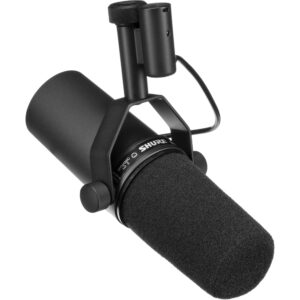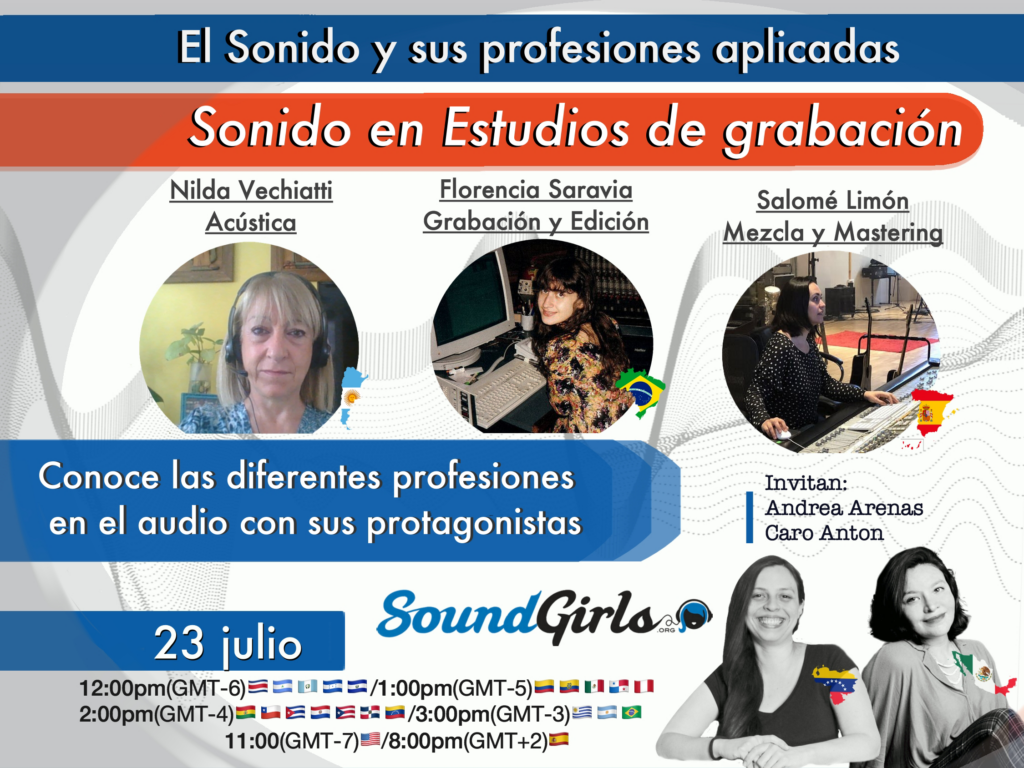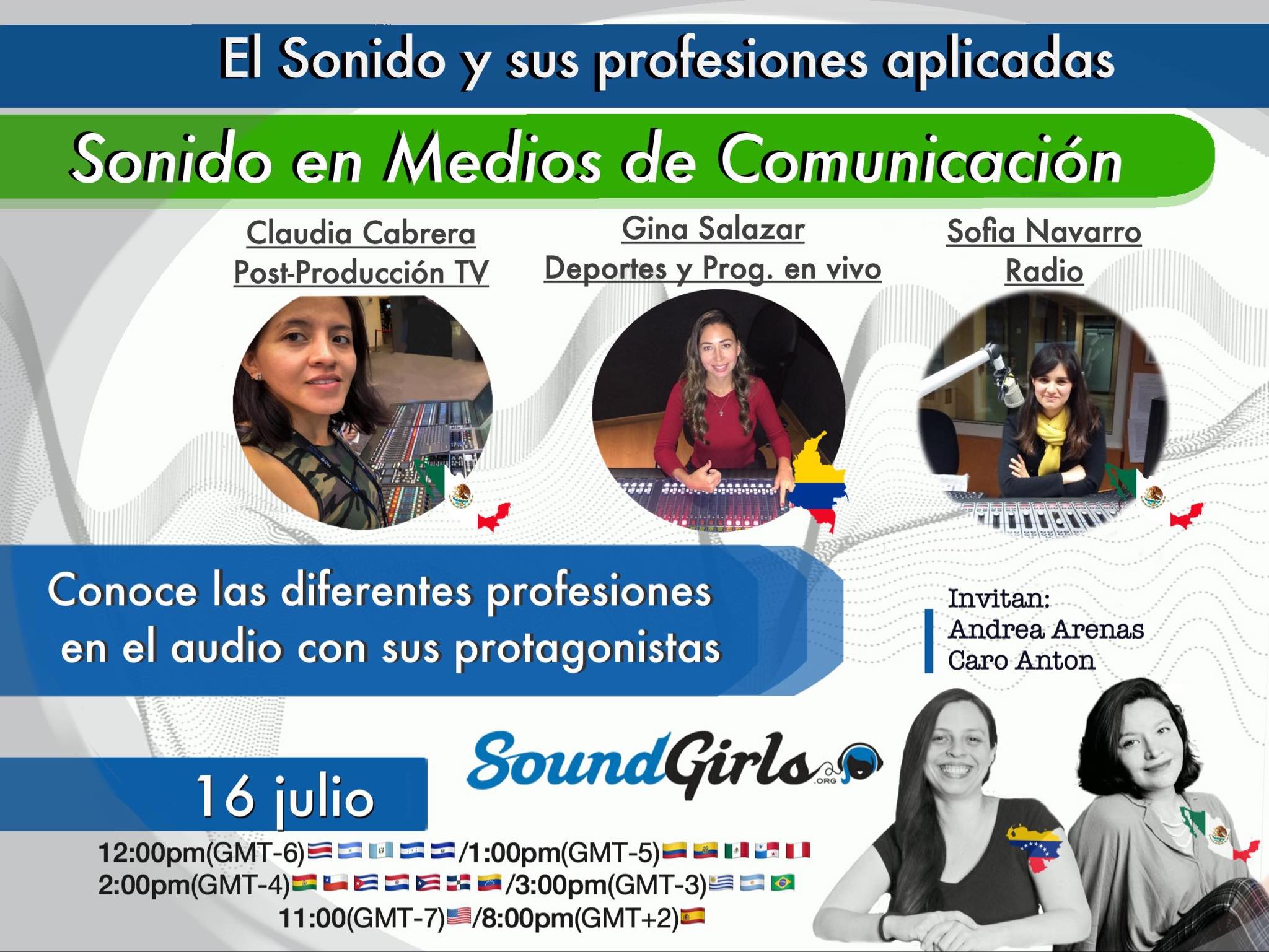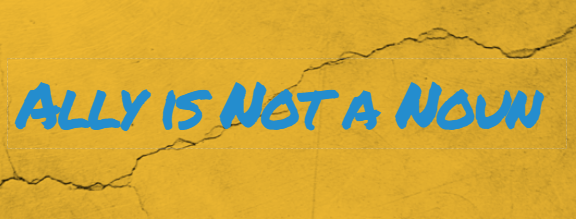Últimamente he recibido MUCHO estas preguntas: Yo, como hombre ¿Qué puedo hacer para ayudar a las mujeres en el audio? ¿Qué podemos hacer para que el mundo del audio/música que históricamente son mayormente dominados por los hombres sea más inclusivo para las mujeres?, ¿Cómo hacemos para tener más mujeres en el audio y el área técnica?
La respuesta corta es ¡CONTRATALAS! Aclaro, que estas preguntas vinieron de hombres que realmente desean ver una industria más inclusiva y balanceada.
Aquí hay algunas acciones simples que los hombres pueden aportar para que haya más mujeres dentro del audio así como en otras áreas dominadas por hombres.
Trata a las mujeres con las que trabajas, con el mismo respeto con que tratas a los hombres con los que trabajas. Las mujeres no piden un trato especial, sólo quieren ser valoradas como iguales.
Cuando alguien te hace una pregunta que debería ser respondida por una colega, en lugar de responder la pregunta, dile a esa persona que le pregunte a tu compañera directamente.
Ejemplo: Se encuentran la ingeniera de sistemas y tú, técnico de monitores; El jefe de producción local, insiste en preguntarte a ti sobre el PA, el rigging, el peso o lo que sea. Simplemente dile “Mariana es nuestra sonidista y puede responderte esto”.
A todos nos gusta obtener respuestas inmediatamente después de hacer una pregunta, pero este simple acto de dirigir las preguntas que corresponden a la compañera, hará que las cosas se muevan mejor a lo largo del show.
Nota: esto debería ser una práctica general y estándar. Siempre deberías dirigir las preguntas que no pertenecen a tu propio trabajo, a la persona apropiada.
Por favor dejen de dar “aprobación” por nosotras. A menos que te consulten por una referencia laboral o para recomendar a una mujer que está siendo considerada para un trabajo, no necesitamos que nadie le asegure al staff del lugar o a quien sea que nosotras podemos hacer ese trabajo y que no necesitan preocuparse por el hecho de que somos mujeres. ¿A quién le importa si el staff o quien sea no lo cree así? Ella y su trabajo pueden hablar por ella misma.
Ejemplo: Una típica conversación entre alguien del staff de la gira y el personal de audio local.
Personal de audio local: ¿Quién es tu personal de audio?
Compañero de gira: Susana, es nuestra ingeniera de FOH, pero no te preocupes que va a hacer un gran trabajo” seguido por una versión abreviada de su currículum.
Susana ya tiene el show asignado y sus calificaciones no son asunto de nadie del staff local.
Cuando quieras entrevistar a una mujer sobre su carrera/trabajo, no gastes su tiempo con preguntas como, ¿cómo es ser mujer en un ambiente dominado por varones? Hazle las mismas preguntas que le harías a un hombre.
En serio, hace 30 años que estoy en esta industria y todavía me preguntan” ¿Por qué hay tan pocas mujeres? ¿Cómo es laborar con puros hombres?” Las mujeres son capaces para dar charlas técnicas e igualmente competentes al discutir sobre habilidades profesionales, experiencia y conocimiento. Estas preguntas no sólo son irrelevantes, también son una pérdida de nuestro tiempo.
Si presencias algo que incomoda a una mujer, di algo.
Hay mujeres que todavía tienen que construir su carrera y su reputación en el negocio y necesitan el apoyo de otras personas, sobre todo del sector veterano de la industria (sean hombres o mujeres). Con demasiada frecuencia el miedo a perder la gira por hablar del asistente que la manoseó, supera su incomodidad. Sería bueno para las mujeres con las que trabajas, saber que pueden contar contigo si en algún momento necesitan que alguien intervenga.
Sé un ejemplo a seguir, especialmente si estás en una posición de liderazgo -como Jefe Técnico/Producción. Trata a las mujeres en tu equipo con el mismo respeto que a los hombres. Haz saber que el comportamiento inapropiado no será tolerado.
Mira, nosotras podemos manejar la “charla de vestuario”. No somos flores pequeñas y delicadas, si lo fuésemos habríamos elegido otra línea de trabajo, pero no estamos acá para complacerte. Estamos acá igual que tú, para hacer nuestro trabajo.
No te sumes en charlas inapropiadas sobre las mujeres de tu equipo y no te quedes callado cuando presencias algo así.
Si quieres que haya más mujeres en tu lugar de trabajo o gira, contrátalas. ¡Existe esta pequeña herramienta fascinante llamada GOOGLE que te ayuda a encontrar cualquier cosa que necesites! Otros fantásticos recursos incluyen el directorio makeiteql.com , soundgirl.org y womensaudiomission.org
Estas son las acciones más básicas que puedes hacer para apoyar a las mujeres.
Si tú REALMENTE quieres hacer una diferencia y generar cambios positivos:
Pregúntate a ti mismo si en el pasado o ahora mismo ¿estás siendo sexista?
¿Alguna vez hiciste gestos cuando el jefe técnico, te mandó tres mujeres para hacer un trabajo pesado?
Considera tus ideas/creencias inconscientes sobre las mujeres en esta industria y tus creencias conscientes.
Observa profundamente tus dobles estándares: ¿Qué cosas está bien que haga un hombre pero no que lo haga una mujer?
¿Por qué tienes estas creencias/ideas?
¿Trabajaste con alguna mujer que no fue buena en un show? ¿O que se terminó enganchando con alguien en la gira? ¿Por qué asumirías que todas las mujeres son así?
¿Te molestaría que una mujer asuma que todos los hombres son sexistas o peor? He trabajado con un montón de hombres que no fueron buenos en su trabajo y que intentaban acostarse con toda mujer que se acerque, y sin embargo no condeno a TODOS los hombres a ser malos en sus trabajos o que sólo están ahí para “levantarse chicas”.
¿Cuándo te quedaste en silencio y observaste un sexismo descarado, o acoso a las mujeres alrededor tuyo pero no quisiste decir nada por riesgo a ser ridiculizado, o simplemente lo ignoraste?
¿Qué tan seguido te sumaste a hacer chistes sobre mujeres del equipo? ¿Cuántas veces viste a uno del lugar coqueteando con o hablando inapropiadamente de aquellas que están ahí sólo para hacer su trabajo? ¿Crees que ellas quieren que les insinúen cosas? ¿Realmente crees que esa chica bonita de stage disfruta tener la obligación de sonreír educadamente ante cada idiota que le tira onda mientras está trabajando? Capaz la chica del “merch” tiene mala cara y no habla con ninguno de ustedes porque ya está cansada de que se la molesten constantemente sus compañeros de trabajo.
¿Cuántas veces hablaste mal de las mujeres del equipo a sus espaldas, haciendo comentarios inapropiados con tus compañeros varones? Mientras que frente a ella actúas como un buen compañero y ellos son “sólo amigos, sólo colegas”. Si no hablaste sobre ellas ¿Cuántas veces guardaste silencio cuando otros lo hacían?
¿Cuántas veces al día, fuera del trabajo, tienes comportamientos sexistas?
¿Sabes lo que es el “mansplaining”? Cuando tienes preguntas o necesitas solucionar un problema ¿inconscientemente buscas al “hombre” a cargo? ¿Ignoras a las novias/esposas de tus amigos asumiendo que no están a tu altura? ¿Alguna vez asumiste que una persona no tendría suficientes conocimientos sobre un tema por el simple hecho de que esa persona era una mujer?
¿Cuántas veces llamaste o te referiste a una mujer como una loca/histérica sólo porque no se contentó con menos de lo que quería o esperaba?
Por ejemplo, una mujer artista que insiste en que las cosas se hagan correctamente, muy probablemente tenga una reputación de ser una perra o ser difícil, mientras que un hombre artista en exactamente la misma situación se consideraría algo normal.
Cuantas veces te han pedido recomendaciones de mujeres con las que has trabajado porque se han presentado “problemas” con su comportamiento que no existían en primera instancia.
“Dale, ¿Se acostó con alguien del crew o de la banda? ¿Estaba durmiendo con alguien en la gira?” ¿Cuántas veces has hecho esas preguntas? ¿Cuántas veces te ha preguntado lo mismo algún colega varón?
Cuando contrates o recomiendes a alguien para una fecha haz un esfuerzo sincero por considerar más que sólo hombres.
De nuevo, el directorio EQL es un gran recurso para encontrar mujeres calificadas.
Las mujeres por necesidad han aprendido a navegar en la industria del audio dominada por los hombres. Con respecto al sexismo, la discriminación o el prejuicio que encontremos, lo ignoramos, lo dejamos pasar o peor, lo aceptamos. Algunas han elegido confrontarlo. Algunas tienen que lidiar con esto muy frecuentemente y otras con tan poca frecuencia que cuando ocurre, estamos completamente desprevenidas. Eso no hace que sea menos cansado. Los puntos que he planteado en este blog son sólo algunas de las cosas que puedes hacer para apoyar no sólo a las mujeres del audio sino a todas las mujeres en general.
Escrito por
Michelle Sabolchick Pettinato: El Amor por la música, la aventura y los viajes llevaron a Michelle a una carrera dentro del audio en vivo. Es fundadora de Soundgirls además de escribir los blogs “la vida en el camino” y “Lo que se necesita para tener éxito en el audio en vivo”. Michelle, es la Creadora / Dueña de Mixing Music Live. En donde se publicó este blog originalmente.
Acerca de Michelle: Michelle, ha pasado los últimos 30 años de gira como ingeniera de sala (FOH) tiempo completo para una variedad de artistas, como: Elvis Costello, Melissa Etheridge, Goo Goo Dolls, Gwen Stefani, Mr. Big, Jewel, Kesha, Indigo Girls, Spin Doctors, entre algunos más.
Read Michelle’s Blog | Other Articles by Michelle

 This microphone is SO versatile. I mean, I’ve recorded vocals on it. I’ve used it as a snare microphone. I’ve used it as a “kick in” microphone. I’ve used this baby on guitar amps and all sorts of other things. That’s why I think it’s such a great mic to have as a staple in your home recording studio. Or even if you’re like me and just looking for a better microphone to record your own vocals with- this one is a fantastic pick.
This microphone is SO versatile. I mean, I’ve recorded vocals on it. I’ve used it as a snare microphone. I’ve used it as a “kick in” microphone. I’ve used this baby on guitar amps and all sorts of other things. That’s why I think it’s such a great mic to have as a staple in your home recording studio. Or even if you’re like me and just looking for a better microphone to record your own vocals with- this one is a fantastic pick. I have heard so many good things about this microphone from friends who do a lot of at-home recordings. It is indeed a condenser mic, so you can expect to get some sweet top off the bat from this one. This mic has a hi-pass filter, and a 20- dB pad to help you capture the perfect tone going INTO the box. The price of this microphone is only $299.99, and they have other models that cost even less. This is just their fan favorite.
I have heard so many good things about this microphone from friends who do a lot of at-home recordings. It is indeed a condenser mic, so you can expect to get some sweet top off the bat from this one. This mic has a hi-pass filter, and a 20- dB pad to help you capture the perfect tone going INTO the box. The price of this microphone is only $299.99, and they have other models that cost even less. This is just their fan favorite. The next microphone is a large jump in price, and most of you might already be familiar, but it is a fantastic, versatile microphone that is great to have if you have the money! The Neumann TLM103. Some may say… this is an obvious choice, but I love this microphone. Like the Sm7b, I can use it on just about anything, but the range of which I can use it on is even wider because it is a large-diaphragm condenser microphone. I can use it on overheads (if I have a pair), vocals, guitars, room mics, etc. The microphone is derived from the class Neumann U 87. There are no pads or hi-pass filters on this microphone, but that’s because the capsule itself is immaculate. This microphone rings in at about $1,100.00 (which isn’t too bad if that’s in your price range especially for a Neumann).
The next microphone is a large jump in price, and most of you might already be familiar, but it is a fantastic, versatile microphone that is great to have if you have the money! The Neumann TLM103. Some may say… this is an obvious choice, but I love this microphone. Like the Sm7b, I can use it on just about anything, but the range of which I can use it on is even wider because it is a large-diaphragm condenser microphone. I can use it on overheads (if I have a pair), vocals, guitars, room mics, etc. The microphone is derived from the class Neumann U 87. There are no pads or hi-pass filters on this microphone, but that’s because the capsule itself is immaculate. This microphone rings in at about $1,100.00 (which isn’t too bad if that’s in your price range especially for a Neumann).









